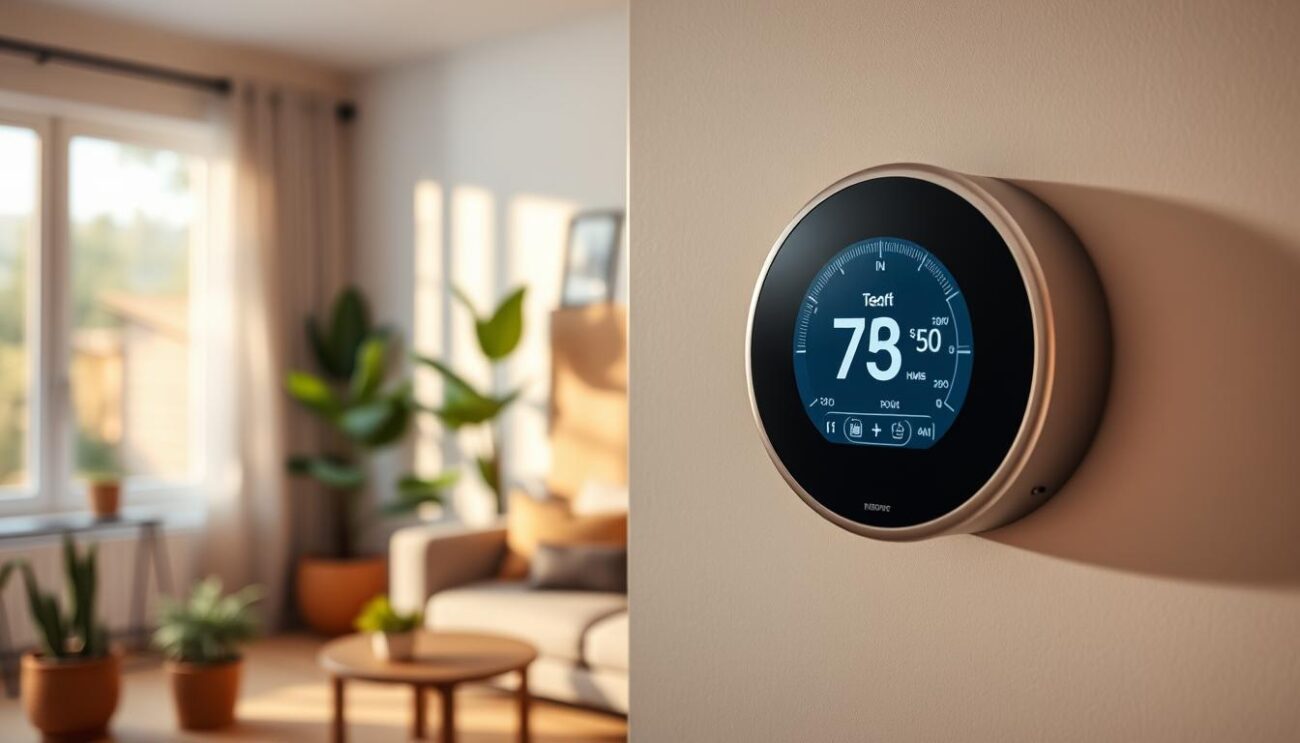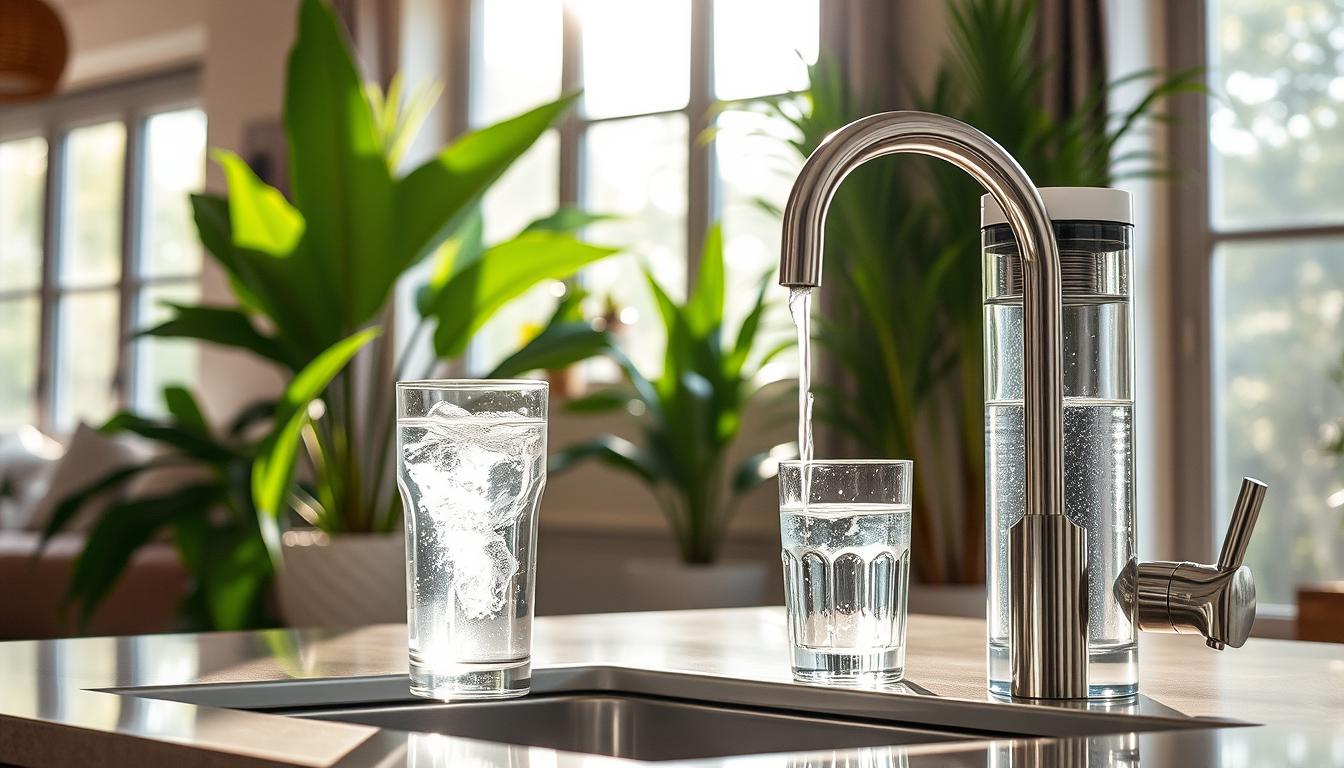Ever thought about why your air conditioner needs clean water? The water in your AC system, called “ACC water”, is key for your home’s comfort. It also helps keep the air inside your home clean. But, how big of a deal is ACC water, and what does it do for your HVAC system? Let’s find out why ACC water is so important for your home’s comfort.
Knowing how vital ACC water is and using top-notch water filters can make your drinking water taste better. It also keeps your air conditioner safe from damage. Keeping your ACC water clean is crucial for your HVAC system’s long life and best performance.
AC by J is a top name in heating, cooling, plumbing, and electrical services in Scottsdale, AZ, and nearby. They know how important ACC water is for your home’s comfort. With their knowledge in HVAC and water treatment, they can make sure your ACC water is clean and pure. This keeps your home cool and comfy all year.
Understanding Your Air Conditioner’s Drainage System
Your air conditioner removes excess moisture from the air. This process creates a lot of condensate water. This water is usually drained outside through a special line. But, if the system doesn’t work right, you might see water leaks.
If Your AC Drains Water Outside
When everything works as it should, the condensate water goes outside. This is normal. The system is designed to get rid of indoor moisture safely. If the line is clear, there shouldn’t be any problems.
If Your AC Drains Water Inside Your Home
Draining water inside means there’s a problem. It could be a clogged line, a broken pan, or a refrigerant leak. These issues can cause water damage and mold. If you see water from your AC, call a HVAC repair expert right away.
| Potential Causes of Indoor Water Drainage | Symptoms |
|---|---|
| Clogged Condensate Drain Line | Water collected in the drain pan, flooding or puddles around the unit, rust along the base, and mildew odors from vents |
| Damaged Drain Pan | Water leaking directly from the unit, potential for water damage and mold growth |
| Refrigerant Leak | Frozen evaporator coils, reduced cooling performance, and increased indoor humidity |
Keeping your acc water drainage system in good shape is key. Regular checks and clearings can stop water damage. This ensures your AC works well.
The Importance of ACC Water
The quality of water in your air conditioning system, called ACC water, is key for its performance and life. Dirty ACC water can cause scale and corrosion. This harms the system’s efficiency, increases energy use, and can damage parts like the compressor or evaporator coil.
Keeping your acc water clean is vital. Use water filters and do regular maintenance. This ensures your air conditioning works well, keeping your home comfortable and saving energy. Bad acc water quality can lead to mineral buildup and corrosion. These problems can shorten your system’s life and worsen your home’s air quality.
| WaterSmart Tool Features | Benefits |
|---|---|
| Near real-time water use visibility | Enables customers to monitor their water consumption |
| Leak, water use, and bill forecast alerts | Helps users manage their water usage and costs |
| Comparison to similar households | Allows customers to benchmark their water usage |
| Automatic leak notifications | Helps identify and address water leaks promptly |
| High use and bill forecast notifications | Enables users to proactively manage their water consumption and costs |
| Unplanned use alerts | Notifies users of any unexpected water usage |
| Online credit card payments | Provides a convenient payment option for customers |
By keeping your acc water clean, your air conditioning system will work better. This makes it last longer and keeps your home safe from mineral buildup and corrosion. This leads to better HVAC efficiency, longer system life, and cleaner air in your home.
Key Components of Your Air Conditioning System
Your air conditioning system has many important parts that work together. They keep your home cool and comfortable. Knowing how these parts work helps you take care of your HVAC system and spot problems early.
Evaporator Coil
The evaporator coil is inside your home. It pulls heat from the air inside. The refrigerant changes from liquid to gas, taking the heat with it. This cools the air, which is then sent back into your home.
Compressor
The compressor is outside your home. It’s key to the system. It makes the refrigerant hot, releasing the heat outside. This lets the refrigerant cool down again, ready to start the cycle over. This cycle keeps your home cool.
Keeping the evaporator coil and compressor clean is crucial. Regular maintenance helps your air conditioner work well. If you notice strange noises, less cooling, or water leaks, get them fixed fast. This keeps your home comfortable all year.
| Component | Role | Maintenance Considerations |
|---|---|---|
| Evaporator Coil | Absorbs heat from indoor air | Regular cleaning to prevent buildup of dust and debris |
| Compressor | Pressurizes refrigerant to release heat outdoors | Periodic inspection and cleaning to maintain efficiency |
Knowing about your air conditioning system’s parts helps keep your home comfortable. If you have problems, get help from HVAC experts. They make sure your system works its best.
Circulating Fan and Its Role
The circulating fan is key to your air conditioning system. It pulls air into the indoor unit and spreads the cooled air around your home. This fan works with the air conditioner and furnace to keep air flowing smoothly.
Keeping the circulating fan in good shape is vital. This includes cleaning, lubricating, and balancing it regularly. If you hear grinding noises, feel weak air flow, or see high energy bills, it’s time to call a pro HVAC maintenance technician.
| Statistic | Value |
|---|---|
| Increased air circulation with circulation fans | Double the air circulation compared to traditional basket fans |
| Recommended placement of circulation fans | Facing each other on opposite ends of a greenhouse for optimal airflow |
| Additional sets of circulation fans for structures over 60 feet long | Advised to ensure adequate air circulation |
| Continuous “on” fan setting vs. “auto” setting | Can increase energy costs by up to $50 more each month |
With a well-maintained circulating fan, your air conditioning system will work better. Regular checks and quick fixes can make your system last longer. This keeps your home’s air quality and comfort just right.
acc water and the Condensing Coil
The condensing coil and fan are key parts of your air conditioning system. They work together to get rid of the heat absorbed by the refrigerant. The hot refrigerant goes through the condensing coil, and the fan blows air over it.
This makes the refrigerant turn back into a liquid. This process lets the heat leave your home. It also lets the refrigerant keep cooling your space.
Common Issues with the Condensing Coil and Fan
Problems with the condensing coil or fan can hurt your system’s performance. Issues like loose or bent fan blades, clogged or damaged fins, or blockages can reduce air flow. This makes your system less efficient.
A refrigerant leak in the coil can also lower your system’s cooling power. Regular checks by a professional can spot and fix these problems.
“Proper maintenance and care of your HVAC system’s condensing coil and fan are crucial for maintaining optimal acc water and energy efficiency.”
Energy Efficiency and Leaving Your AC On
Finding the right balance between energy efficiency and comfort is key when using your air conditioner. It’s often better to keep it running at a higher temperature (around 78°F) when you’re away. This is more efficient than turning it off completely.
Setting your thermostat to adjust when you’re not home can save you money. It keeps your home comfortable and prevents the system from working too hard when you return. This helps maintain a steady temperature and humidity level.
Keeping humidity levels consistent is also important. It stops mold and mildew from growing, protecting your home. The U.S. Department of Energy says setting your thermostat high in summer saves energy. NYSERDA notes a 3% energy cost drop for every degree up.
A programmable thermostat can help manage your AC settings efficiently. This leads to big savings on electricity. Leaving your AC on at a moderate level reduces strain on the unit and saves on repair costs.
| Apartment | AC Unit Size | Energy Usage (AC Off) | Energy Usage (AC On) | Energy Cost Difference |
|---|---|---|---|---|
| 1st Floor | 18,000 BTU Heat Pump | 7 kWh | 4 kWh | 44¢ per day |
| 2nd Floor | 12,000 BTU Window AC | 18 kWh | 12 kWh | $1.27 per day |
| 3rd Floor | 12,000 BTU Window AC | 12 kWh | 11 kWh | 20¢ per day |
The data shows leaving your AC on at a moderate temperature saves a lot of energy and money. This is especially true compared to turning it off completely. By using these energy-saving tips, you can enjoy a comfortable home while also reducing your environmental impact and bills.
Maintaining Optimal Humidity Levels
Your air conditioning system is key to keeping your home’s humidity right. It’s important to keep humidity between 30% to 50% for comfort and health.
Too much humidity, even at 60%, can cause big problems. Mold and mildew grow well in damp air, harming your health. Also, high humidity lets insects multiply, damaging your home and belongings.
Risks of Excessive Humidity
- Mold and mildew growth, which can affect indoor air quality and health
- Increased risk of insect infestations, such as dust mites, that can cause further damage
- Discomfort and unpleasant odors due to the damp environment
Running your air conditioner at a lower setting when you’re out helps keep humidity balanced. It’s important to choose the right air conditioning unit for your home. This ensures it can remove excess moisture from the air.
| Recommended Indoor Humidity Levels | Percentage Range |
|---|---|
| Summer | 30% – 50% |
| Winter | 30% – 40% |
Keeping humidity levels right makes your home healthier and more comfortable. It also protects your home from moisture damage.
Programing Your Thermostat for Efficiency
Programmable thermostats help save energy by adjusting your air conditioning when you’re not home. This stops the air conditioner from running at a low temperature all day. It’s a common mistake that wastes a lot of energy.
When you’re away, set the thermostat to a higher temperature, like 78°F. Then, program it to cool down to a comfortable setting when you return. This saves money on your energy bills and keeps humidity levels steady. It also makes your HVAC system work less hard.
The Department of Energy says lowering your home’s temperature by 7 to 10 degrees for eight hours a day can save up to 10% on heating and cooling costs. Setting your thermostat back 7 to 10 degrees while you’re away at work can also save a lot of energy.
Smart thermostats, like those from top HVAC brands, learn your temperature preferences. They adjust the settings for you, so you don’t have to. This makes it easier to keep your energy use low all year.
Keeping your HVAC system, including the thermostat, in good shape is key for comfort all year. Bob’s Heating & Air Conditioning offers maintenance plans to keep your system running well.
| Season | Recommended Temperature Range | Energy-Saving Tips |
|---|---|---|
| Summer | 78°F or higher when present | Set thermostat 5-8°F higher when away |
| Winter | 68°F when occupied | Set thermostat 7-10°F lower when away |
| Spring/Fall | 68-78°F | Adjust thermostat based on presence |
By programming your thermostat right and keeping your HVAC system in good shape, you can save energy. This ensures your home stays comfortable all year.
“Setting your thermostat to Auto instead of On, Cool, or Heat can save energy by stopping the fan when not needed.”

Conclusion
The quality of water in your air conditioning system, known as acc water, is key for your HVAC’s performance and life. By using advanced water filtration solutions and maintaining your system well, you get clean drinking water. You also improve indoor air quality, save energy, and boost HVAC efficiency.
Understanding your HVAC’s parts and setting your thermostat right is crucial. A complete maintenance plan keeps your home comfy and your bills low. Taking care of your acc water system makes your home more comfortable and helps the planet.
Most adaptation actions involve water, as the IPCC’s AR6 Working Group II Report shows. Water resilience is now a big part of water management and policy. So, making your HVAC’s acc water quality better is a smart move for a more resilient home. By following the best practices in this article, your HVAC will work well for many years.



